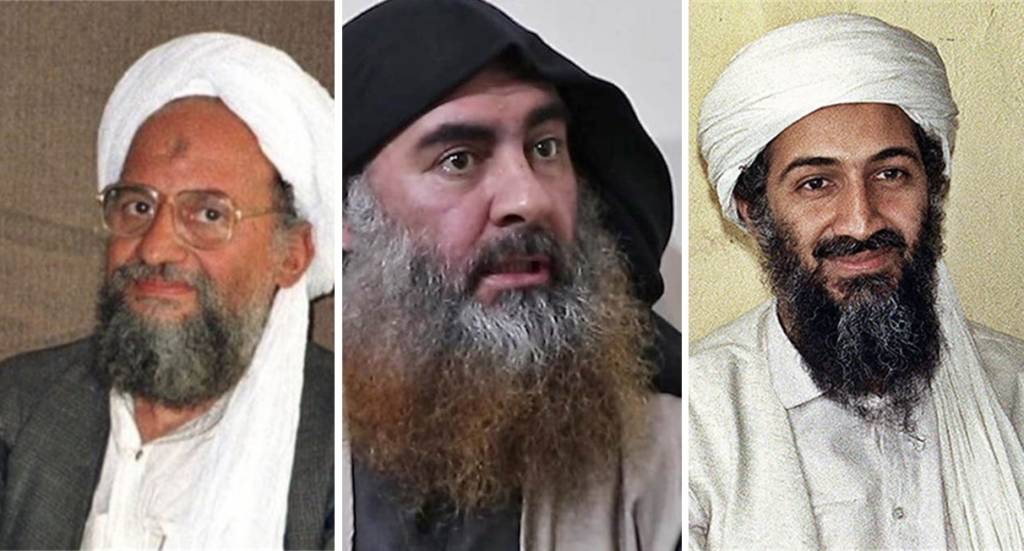As the news of ISIS leader Abu-Bakr-al-Baghdadi’s death was delivered by the United States President Donald Trump, the whole of the world heaved a collective sigh of relief as the extremist Islamist terrorist had wreaked havoc all around the globe with his terrorist activities. The self-styled Caliph who wanted to establish an Islamic Caliphate had a $25 million (£19M) bounty on his head and was being pursued by the US and its allies since the rise of IS five years ago.
Baghdadi was born in 1971 in the central Iraqi city of Samarra and after finishing school in the early 1990s he moved to the capital, Baghdad where he gained bachelor’s and master’s degrees in Islamic studies before embarking on a PhD at the Islamic University of Baghdad, according to a biography published by supporters.
It is a peculiar fact that despite being well-educated, Baghdadi kept the world on its toes with his evil and vile terrorist activities. Interestingly a pattern is observed with Islamist terrorists of the likes of Baghdadi, Osama-bin_Laden and Al-Zawahiri.
Contrary to popular beliefs, the world’s most dreaded terrorists have been educated to the highest standards. After digging a little through reports and the profiles of some high-profile terrorists, you might be surprised to know that most of them are highly educated and have led comfortable lives and lack of education and Islamic terrorism do not have a correlation
Baghdadi was not the only terrorist with high educational qualifications. Osama Bin Laden, the world’s most wanted terrorist after the 9/11 twin-towers attack had completed his civil engineering degree in 1979. The al-Qaeda leader had studied economics and business administration from King Abdulaziz University. Ayman al-Zawahiri who succeeded as the leader of al-Qaeda after Osama is a trained surgeon. It is estimated that some 35 per cent of al-Qaeda members are college-educated and 45 per cent were engaged in skilled professions before being recruited.
The Lashkar-e-Tayyeba, a global terrorist group based in the terrorist state Pakistan, has professionals like engineers, doctors and technicians, in its role, most of them are either alumni of colleges and institutes run by the group or employed in the hospitals and engineering colleges operated by their affiliates. The co-founder Hafiz Saeed holds two masters degree from the University of Punjab.
Even in India, the now hanged terrorist Afzal Guru involved in the 2001 parliament attacks had completed his higher secondary education from Sopore and later got enrolled in Jhelum Valley medical college and completed his first year of MBBS and had also prepared for competitive exams.
The Easter Sunday bombing that took place in Sri Lanka earlier this year also broke the myth of terrorists being poor and uneducated. Ruwan Wijewardene, Sri Lanka’s junior defence minister had told a press conference “Most of the bombers are well-educated and come from economically strong families. Some of them went abroad for studies,” One suspected attacker went to law school in Australia while two others, brothers, grew up sons of a wealthy and well-established businessman.
There is a notion that extremist movements in various parts of the world recruit their followers from only amongst the poor and uneducated. Two of the most common arguments made to explain radicalisation are economic deprivation and a lack of education. The number of young professionals joining or pledging allegiance to extremist and jihadist movements and organisations is on the rise. In the minds of many, poverty and violence often go together. Any connection between poverty, education, and terrorism is indirect, and very weak.
The argument of terrorists emerging from low education opportunity backgrounds is often justified using the assumption that those who have less to lose or are the lone wolves are more likely to resort to violence to achieve their goals.
However, the counter-argument in terms of terrorism, especially religious extremism, is that it requires great levels of commitment to the goals of the terror organisation which are usually deeply political. The understanding of the issues involved when committing to these principles is easier for those who are better educated.
People from well off and educated backgrounds are more likely to participate in politics, partly because political involvement requires some minimum level of interest, expertise, commitment to issues and effort, all of which are more likely if people are educated and wealthy enough to concern themselves with more than mere economic sustenance.
Therefore terrorist organizations may prefer to use highly educated individuals as operatives because they are better suited to carry out acts of international terrorism than are impoverished illiterates since the terrorists must fit into a foreign environment to be successful.
According to a report in Tablet since 2001, several studies (by some of the world’s leading economic minds such as the former chairman of Obama’s White House Council of Economic Advisers, Alan Krueger) have investigated the relationship between individual economic conditions and terrorism. These studies collected data on the characteristics of key terrorist groups such as Hezbollah militants, Muslim terrorists who lived and operated in the U.S. between 1993 and 2008, and deceased martyrs from the Palestinian Islamic Jihad (PIJ) and the Palestinian National Authority (PNA) from 1987 to 2002.
None of the statistical analyses found a definitive link between terrorism and poverty at the individual level. Just the opposite, in fact—the major comprehensive empirical studies generally suggest that terrorists are more likely to come from better financial backgrounds, belong to a higher socio-economic group, or simply be above the poverty line. The definite conclusion: Economic conditions at the individual level do not have an impact on terrorism.
The terrorists which many ‘intellectuals’ and pro-Islamists believe choose the path of terrorism due to lack of education and abject poverty should go through the profiles of such terrorists and then make their case whether lack of education pushes anybody to the cesspool of terrorism or not.
